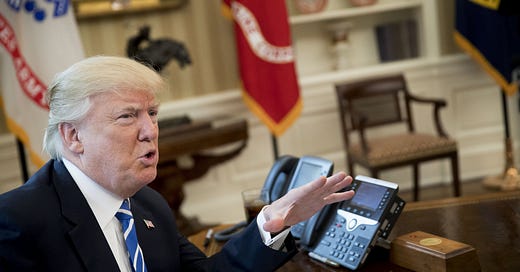What does the election mean for banking?
The short answer: I have no idea. But here are a few guesses
Donald Trump now shares, with Grover Cleveland, the status as a US president elected to nonconsecutive terms. The question for readers of this blog—well, among many, I suppose—is what impact the election will have on banks.
The capital markets have made a bold prediction. Bank equities are up on the news, presumably in anticipation of lower regulatory costs and higher net-interest income. Bankers generally agree: according to a survey from American Banker, bankers generally preferred Trump over Harris for banking.
I think in general bankers and investors are probably right. The Trump Administration and the Republican-controlled Senate will likely mean fewer regulations, enforcement actions, and other cost impositions from regulators. We may see, as we did in 2017, another change to existing law to rein in regulators even further with more specific legislative instruction on what bank supervisors can or cannot do.
But the logic to these predictions may also have grown a little stale.
Are we in a new political order?
Once upon a time, on or around the first Franklin Roosevelt Administration, there was a growing sensibility that Democrats favored the interests of smaller banks and, more dividedly, bank customers. This New Deal Order continued through the consumer financial protection revolution in the 1960s and 1970s, with Democratic Congresses leading the charge to create the Community Reinvestment Act, the Equal Credit Opportunity Act, the Home Mortgage Disclosure Act, the Truth in Lending Act, the Fair Credit Reporting Act, and many other pieces of legislation, all passed within a decade of each other.
As Gary Gerstle has argued, though, political orders give way to each other, and the Neoliberal Order displaced the New Deal Order as Democrats and Republicans alike viewed governmental interventions into markets—including (perhaps especially) financial markets—as a hindrance to the good society. The legislation that passed during both Republican and Democratic Administrations from 1980 to 2008 were mostly, though not uniformly, favorable to industry interests.
The problem with anticipating the Second Trump Administration is that we are neither in the New Deal Order nor in the Neoliberal Order. With the Global Financial Crisis, something new began on a transatlantic basis, something that sounds in both left- and right-wing populism. It is no longer clear to identify either Republicans or Democrats as consistent defenders of the banking industry. Certainly Vice President-elect Vance is not someone we can identify as part of the crowd to defend the largest banks, as representatives of that wing of the Republican coalition made clear when President-elect Trump was vetting him for that position.
Let’s take three issues, for example, to highlight why I think it is too early to predict exactly what the Republican takeover of Congress and the White House means for banking.
The Community Reinvestment Act
The agencies finalized their rule in October 2023. Bank lobbyists sued shortly thereafter. A thorough update to the CRA has not occurred since 2005, despite some efforts during the first Trump Administration to update it in ways that the industry favored.
I have no idea what the new Administration will think of this rule. They may refuse to defend it in court and let it die a slow death of attrition there. But the CRA offers a lot to right-wing populists. The statute requires banks that wish to grow to demonstrate their commitment to reinvest in their local communities. The new regulations seek to tailor these rules to banks by size, imposing the largest regulatory costs on the largest banks (a reason why the large banks sued to prevent the rule’s enforcement). If such populists control the agenda in, say, the OCC (which took lead on the rule), then I feel uncertain about changes to the finalized rule.
Verdict: I lean toward the conclusion that the Trump Administration means laxer CRA enforcement, but predict that the rule will stay the same unless invalidated by courts. If the latter occurs, I expect path of least resistance: no new rule reproposed.
Bank Capital Rules
Few issues have grabbed the banks’ attention—and, through them, the public’s attention—like the so-called Basel III Endgame brouhaha that has played out over the last 18 months. First the Biden regulators issued a proposed rule, to which the banks launched an unprecedented political campaign to defeat. That campaign succeeded in causing the Fed to repropose the rule, but the other regulators have so far not signed on to the new rule.
Had Harris won, I would have urged the Democrats to repropose the rule again and to stop negotiating with themselves.
Now that Trump has won, my generic advice is essentially the same, but with an uncertain conclusion. The Republicans should respect their base on these inherently political issues. But that calls the question. I have no idea what the Trump base expects for capital reform.
The right-wing populist tradition contains profound skepticism of banks’ penchant for debt. Louisiana Republican David Vitter, for example, joined hands with Elizabeth Warren to sponsor legislation that would have elevated capital rules by law, not regulation. There is not unanimity in the party on whether capital is such a burden. Former Trump Administration official Mark Calabria, for example, is generally much more in favor of higher capital requirements.
That said, the pitch of enthusiasm for at most cosmetic changes to bank capital among Republicans was very high over the Basel III Endgame proposal.
My verdict: The Populist Order will skip the bank capital debates. Basel III is likely dead, to be replaced by nothing.
What is coming?
There’s more to say about more issues, including about crypto reform, credit union reform, Fed independence, sanctions, AML, interchange regulation, and so much more.
I look forward to the debate.




